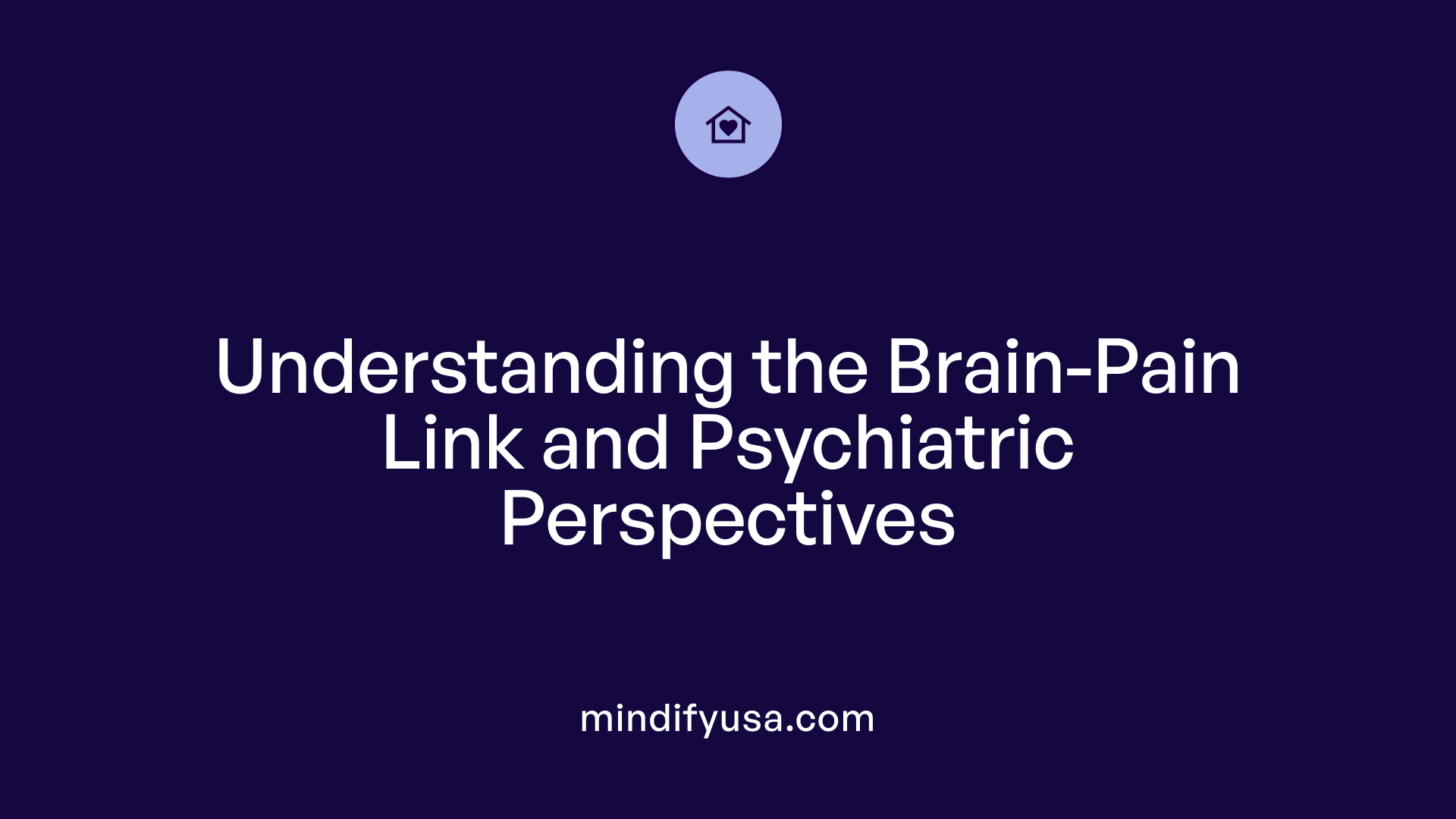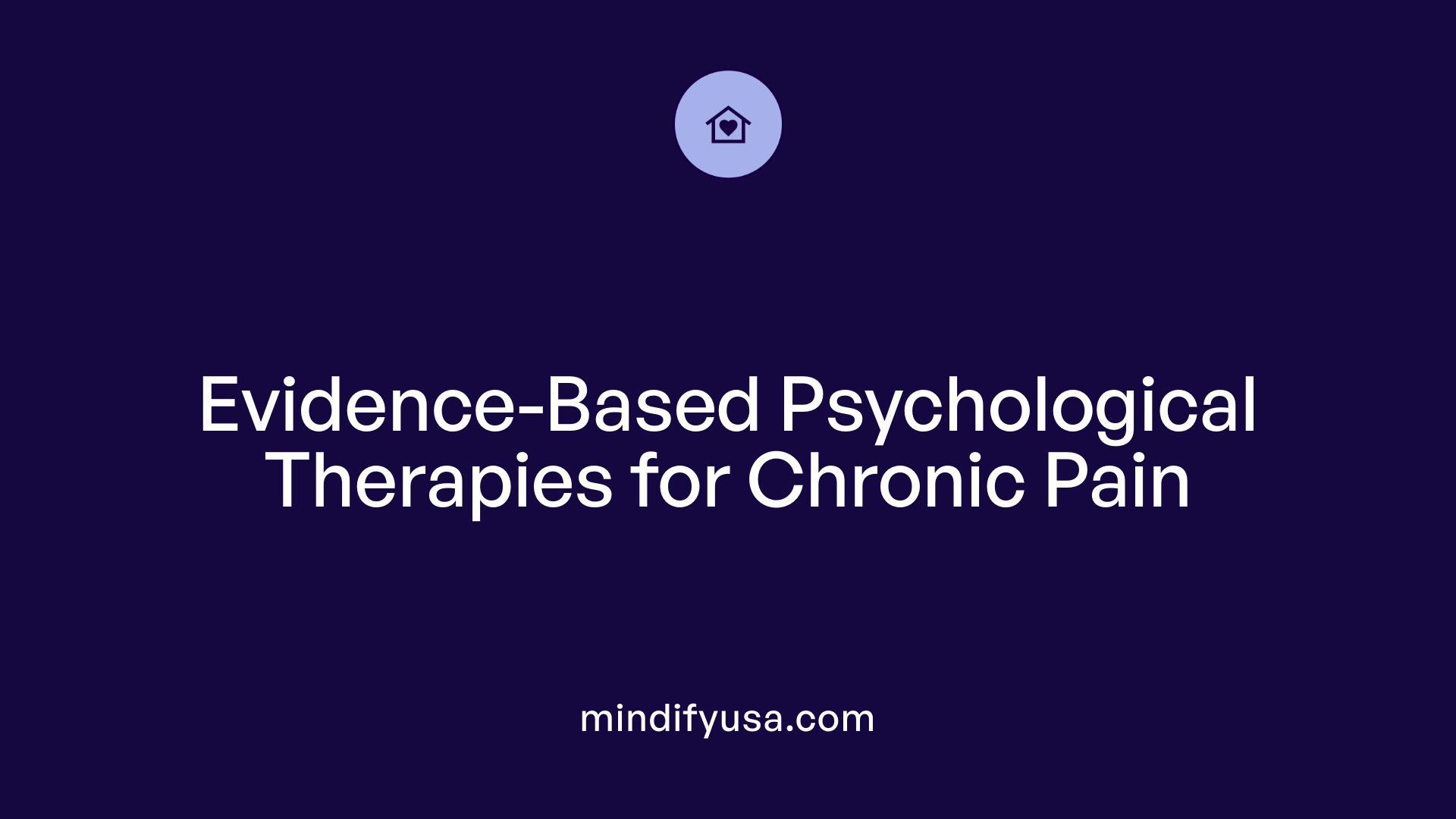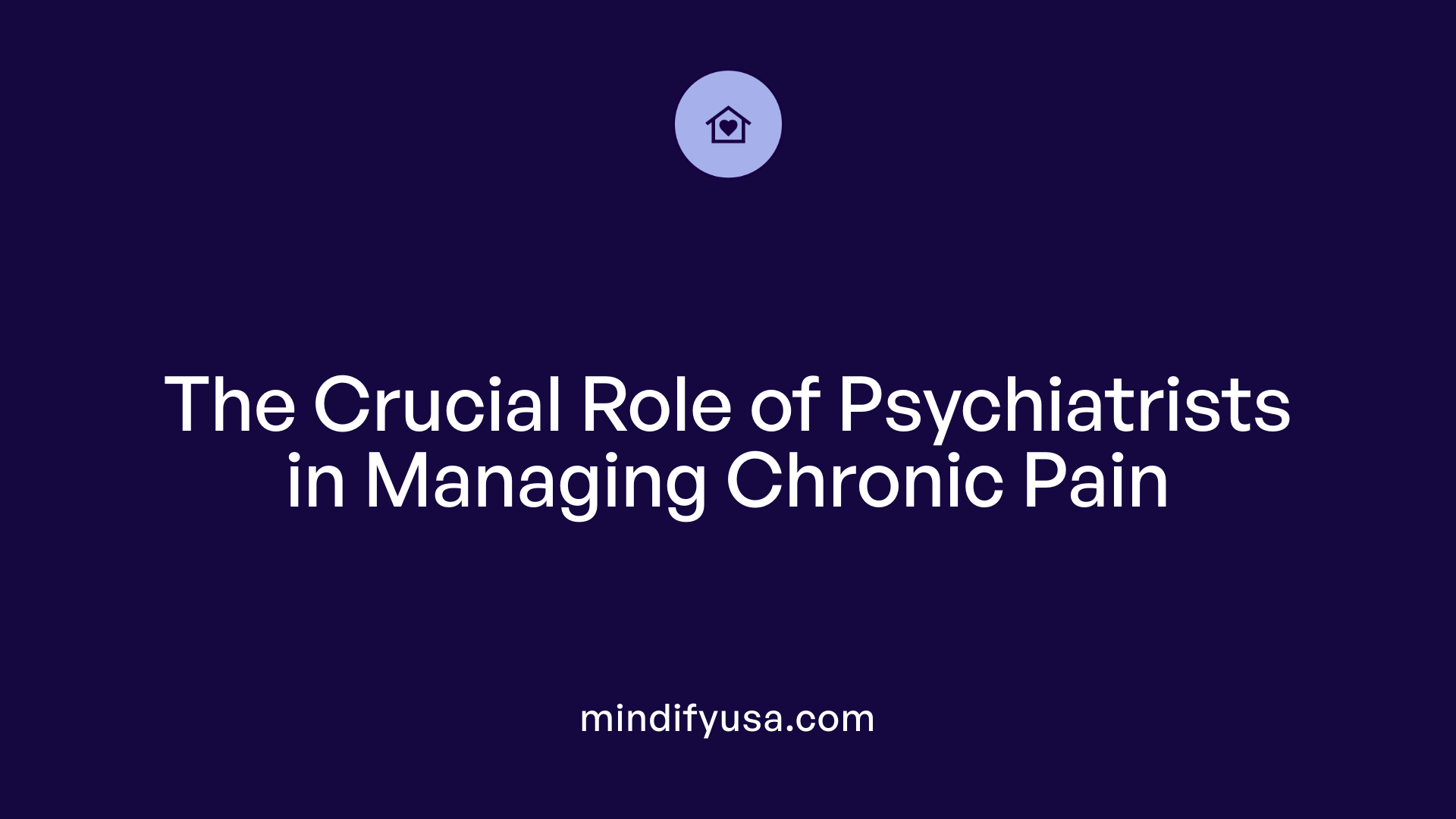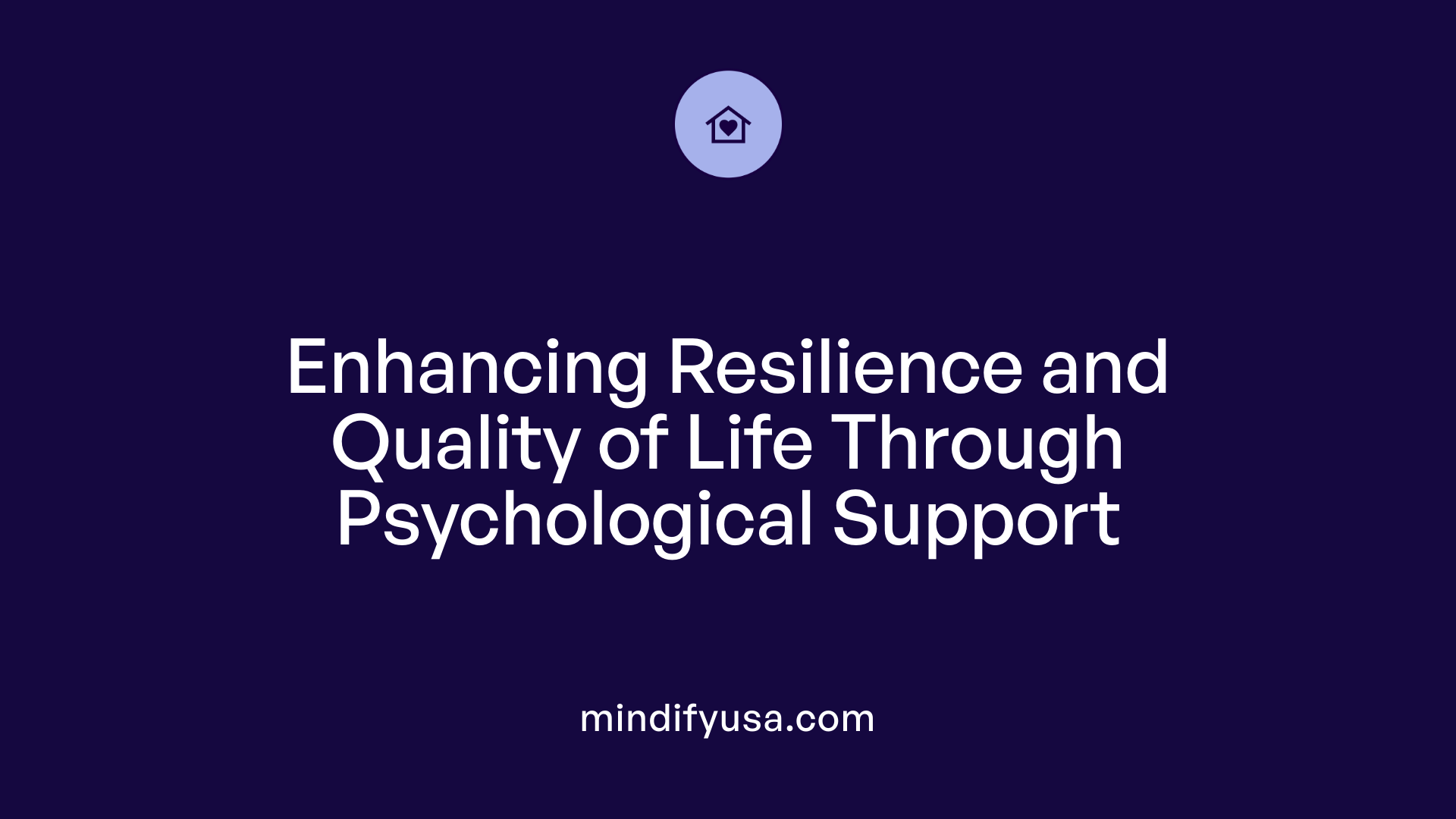Understanding the Crucial Role of Psychiatric Care in Chronic Pain
Chronic pain affects millions worldwide, intricately intertwined with mental health issues such as depression and anxiety. Recognizing and integrating psychiatric care into pain management can significantly improve outcomes, offering a holistic approach that addresses both physical sensations and emotional well-being. This article explores how psychiatric interventions support individuals living with chronic pain, emphasizing evidence-based therapies, interdisciplinary collaboration, and the importance of addressing mental health to enhance quality of life.
The Complex Brain-Pain Connection and the Role of Psychiatric Care

What is the role of psychiatric care and psychological therapies in managing chronic pain?
Psychiatric care and psychological therapies are essential components in the comprehensive management of chronic pain. They target the intricate biopsychosocial factors that influence how individuals perceive and cope with pain. These therapies, such as cognitive-behavioral therapy (CBT), mindfulness-based stress reduction (MBSR), acceptance and commitment therapy (ACT), and operant-behavioral therapy, focus on enhancing emotional resilience, social engagement, and functional capacity.
Instead of solely aiming to eliminate pain, psychological interventions help patients develop effective coping mechanisms, reframe negative thoughts, and accept their condition. This approach not only reduces emotional suffering but also diminishes the impact of pain on daily life. Research demonstrates that such therapies can lead to lasting improvements in mental health and overall quality of life, often breaking the cycle where stress amplifies pain.
Psychological treatments tend to be well tolerated, with minimal risks, making them a safe complement to medical and physical therapies. Their ability to modify the brain’s response to pain, reduce disability, and foster emotional well-being underscores their vital role in patient-centered pain management.
Integrating these therapies allows healthcare providers to address the unique psychological facets that influence pain perception, thus facilitating a holistic approach that can lead to better outcomes.
Psychological Interventions and Evidence-Based Approaches

What are the mental health interventions available for chronic pain?
Managing chronic pain effectively often involves a combination of psychological treatments aimed at addressing emotional and cognitive responses to pain. Common interventions include cognitive-behavioral therapy (CBT), mindfulness-based stress reduction (MBSR), acceptance and commitment therapy (ACT), relaxation techniques, biofeedback, and hypnosis.
CBT is considered the gold standard in psychological pain management. It focuses on restructuring maladaptive thoughts and beliefs about pain, reducing emotional distress, and enhancing self-efficacy. By changing automatic negative thoughts, patients can better cope with their pain and improve functioning.
MBSR and ACT promote acceptance of pain and foster mental flexibility. MBSR uses mindfulness meditation practices to increase present-moment awareness, helping patients detach from pain-related distress. ACT encourages patients to accept their pain while committing to valued life activities, reducing suffering.
Relaxation techniques and biofeedback help regulate physiological responses. Biofeedback teaches patients to control bodily functions like muscle tension and heart rate, promoting relaxation and reducing pain intensity.
Hypnosis and somatic anchoring are additional techniques that promote bodily awareness and stress relief.
Overall, these therapies generally have low risks and are supported by research for their effectiveness in improving mental health and managing pain. They are particularly useful in conditions like fibromyalgia, migraines, and chronic back pain, where psychological factors significantly influence pain perception.
Are therapies like Cognitive Behavioral Therapy (CBT) and TMS effective in supporting individuals with chronic pain?
Yes, both CBT and Transcranial Magnetic Stimulation (TMS) are supported by evidence as effective treatments for chronic pain.
CBT for chronic pain (CBT-CP) helps patients reframe negative thought patterns related to their pain, reduce emotional distress, and develop practical self-management skills. Studies have shown that CBT can decrease pain severity, lessen depressive and anxious symptoms, and improve overall quality of life. It encourages active participation in daily activities and promotes adaptive behaviors.
TMS is a non-invasive, drug-free intervention that uses magnetic fields to stimulate specific brain regions involved in pain processing. High-frequency TMS targeting the motor cortex has demonstrated significant reductions in pain scores across various chronic pain conditions such as fibromyalgia, neuropathic pain, and migraines.
Research indicates that TMS can provide sustained pain relief, often lasting several months, especially when combined with other treatments like medication or psychotherapy. The safety profile of TMS is well-established, making it a promising addition to multidisciplinary pain management programs.
Both CBT and TMS are valuable tools that address different aspects of chronic pain—psychological resilience and neurobiological mechanisms—and together, they contribute to comprehensive, patient-centered care.
The Contributions of Psychiatrists in Chronic Pain Treatment

How do psychiatrists contribute to chronic pain treatment?
Psychiatrists bring a vital perspective to managing chronic pain, especially considering its complex, multifaceted nature. Their role goes beyond traditional medical approaches by focusing on psychological and behavioral aspects that influence pain perception and patient well-being.
One of their primary contributions is addressing co-occurring psychiatric conditions such as depression, anxiety, and substance use disorders. These mental health issues are common in individuals with chronic pain, often making symptoms worse and complicating treatment. By diagnosing and treating these conditions, psychiatrists help reduce overall distress and improve pain management outcomes.
Developing and implementing psychological therapies forms another cornerstone of their work. Evidence-based approaches like cognitive-behavioral therapy (CBT) help patients identify and challenge automatic or negative thoughts related to pain and activity. Acceptance and Commitment Therapy (ACT) encourages patients to accept pain without excessive struggle, fostering psychological flexibility and resilience. Mindfulness and relaxation techniques, often guided by psychiatrists, are used to reduce stress responses that can amplify pain sensations.
Medication management is also crucial. Psychiatrists prescribe and oversee medications such as antidepressants, anticonvulsants, and muscle relaxants that serve dual purposes. For instance, certain antidepressants like SNRIs (serotonin and norepinephrine reuptake inhibitors) and tricyclic antidepressants (TCAs) not only treat depression but also have analgesic properties. Gabapentinoids, initially seizure medications, are used to manage neuropathic pain. In some cases, low-dose opioids, including buprenorphine, are considered, with careful monitoring to prevent dependence.
Additionally, psychiatrists are integral to multidisciplinary pain management teams. They conduct comprehensive assessments focusing on the severity of pain, psychosocial factors, and treatment responsiveness. Their evaluations guide personalized care plans that integrate medical, psychological, and social interventions.
A critical aspect of their work involves minimizing risks associated with opioid therapy. Psychiatrists screen for addiction risk, support safe prescribing practices, and help with tapering or alternative pain strategies if dependency issues arise. They also ensure treatment aligns with best practices for safety and efficacy.
Through their holistic approach, psychiatrists help reduce the emotional burden of chronic pain, enhance patient engagement in treatment, and promote functional improvements. Their interventions can diminish the perception of pain and increase overall quality of life.
In summary, psychiatrists contribute significantly to chronic pain treatment by managing co-occurring psychiatric conditions, developing tailored psychological therapies, and overseeing medication strategies. Their expertise facilitates a comprehensive, biopsychosocial approach that aims for better, sustainable patient outcomes.
Implementation of Evidence-Based Psychological Approaches and Collaborative Care Models

What is the importance of integrated care models that include psychiatric and psychological services for chronic pain?
Integrated care models that involve psychiatric and psychological services play a crucial role in effectively managing chronic pain. These models offer a holistic, biopsychosocial approach that targets both the physical aspects of pain and the emotional and mental health challenges associated with it.
One of the key strengths of integrated care is its ability to facilitate early screening and treatment for psychiatric conditions such as depression and anxiety. Since nearly half of all individuals with chronic pain also experience mood or anxiety disorders, addressing these issues promptly can significantly improve pain outcomes.
Evidence-based psychological therapies, such as cognitive-behavioral therapy (CBT), Acceptance and Commitment Therapy (ACT), and Mindfulness-Based Stress Reduction (MBSR), are integral components of integrated care. These approaches help patients modify maladaptive thoughts, develop new coping skills, and reduce stress, which can all diminish pain perception.
Beyond individual therapy, newer interventions like Transcranial Magnetic Stimulation (TMS) have shown promise in treating both depression and chronic pain by modulating brain circuits involved in pain processing and mood regulation.
Multidisciplinary teams typically include psychiatrists, psychologists, physicians, physical therapists, and social workers. This collaboration ensures comprehensive assessment, personalized treatment plans, and continuous support. Such teamwork promotes consistency in care delivery and reduces fragmentation in treatment approaches.
Improving access and outcomes through integrated models can lead to reduced reliance on opioids and other medications, lower healthcare costs, and faster improvements in functionality and quality of life. Patients benefit from tailored strategies that address their unique needs, whether through medication management, psychotherapy, lifestyle modifications, or adjunctive therapies.
Studies underscore that integrated care not only enhances patient engagement but also fosters better adherence to treatment plans, creating a supportive environment for recovery.
By blending medical, psychological, and behavioral health strategies, these models aim to achieve sustainable improvements in managing chronic pain while addressing its psychological dimensions.
How do evidence-based therapies contribute to pain management?
CBT, ACT, MBSR, and other therapies are supported by research for their effectiveness in pain management. These approaches work by changing how the brain interprets and responds to pain signals, often reducing the intensity and emotional impact of chronic pain.
CBT focuses on restructuring unhelpful thoughts and beliefs about pain, reducing catastrophizing and promoting adaptive behaviors.
ACT encourages acceptance of pain and commitment to valued activities, fostering psychological flexibility.
MBSR uses mindfulness meditation and relaxation techniques to decrease stress responses and improve emotional regulation.
TMS, a non-invasive brain stimulation technique, targets specific regions involved in mood and pain regulation, helping alleviate both depression and pain.
Together, these therapies empower patients with self-management tools, foster resilience, and can even reduce the need for medication, including opioids.
Enhancing outcomes through collaborative, multidisciplinary efforts
Implementing these psychological approaches within a team setting allows for seamless care coordination. Regular communication among providers ensures that treatment is tailored, dynamic, and responsive to patient progress.
Healthcare policies and evolving payment models increasingly support multidisciplinary care, recognizing its effectiveness and cost benefits.
Enhanced training for healthcare providers in pain psychology and mental health assessment ensures early detection and intervention.
Screening tools like PHQ-9 and GAD-7 are used routinely to monitor mental health status, guiding treatment adjustments.
By utilizing outcome measures and patient feedback, teams can track progress and refine interventions to maximize benefits.
Improving access to psychological and psychiatric services
Overcoming barriers to mental health care involves expanding telehealth options, integrating services into primary care settings, and training non-specialist providers.
Such strategies increase reach, especially for underserved populations and older adults, who are more vulnerable to chronic pain and its psychological effects.
A comprehensive approach for better patient outcomes
Overall, integrating evidence-based psychological therapies within collaborative care models enhances the capacity to reduce pain, improve mental health, and restore functional independence. This systematic, multidisciplinary effort offers a sustainable pathway to improve long-term outcomes for individuals living with chronic pain.
For ongoing learning and implementation, further research and policy support are essential to embed these practices into routine care frameworks.
More Information Search Query: integrated care models for chronic pain
The Impact of Psychological Support on Daily Life and Resilience

How does psychological support impact pain coping skills and quality of life?
Psychological support plays a vital role in helping individuals with chronic pain develop better coping skills and enhance their overall quality of life. Through targeted therapies such as cognitive-behavioral therapy (CBT), mindfulness-based stress reduction (MBSR), and acceptance and commitment therapy (ACT), patients learn to reframe negative thoughts and emotional reactions associated with pain.
These interventions focus on teaching practical strategies that modify unhelpful automatic thoughts, such as catastrophizing or black-and-white thinking about pain and functionality. By addressing these thought patterns, patients can reduce emotional distress and become more resilient in managing their condition.
Furthermore, psychological support aids in reducing anxiety and depression, which frequently co-occur with chronic pain and can worsen pain perception and disability. As patients learn relaxation techniques, mindfulness practices, and stress management skills, they become better equipped to handle fluctuations in pain levels.
Psychological therapies also facilitate lifestyle changes, such as improving sleep hygiene, increasing physical activity, and engaging in meaningful activities despite limitations. These changes can lessen the impact of pain on daily routines and social interactions.
A strong psychological foundation fosters increased resilience, enabling patients to adapt to their condition and maintain a more positive outlook on life. This resilience supports continued participation in work, hobbies, and social connections, which are crucial for emotional well-being.
Evidence from multiple studies indicates that integrating psychological approaches into pain management regimens results in decreased pain intensity, reduced disability, and lower emotional burden. This comprehensive approach addresses not just the physical sensations of pain but also the emotional and behavioral reactions, leading to improved overall functioning.
In summary, psychological support enhances coping strategies, encourages positive lifestyle adjustments, and builds resilience, thereby significantly improving the quality of life for those living with chronic pain.
The Path Forward: Holistic, Integrated Pain Management
Treating chronic pain effectively requires a holistic, interdisciplinary approach that vigorously incorporates psychiatric and psychological care. Such integration not only addresses the physical dimensions of pain but also tackles emotional distress, mental health conditions, and behaviors that sustain pain and disability. Evidence-based therapies like CBT, ACT, and mindfulness-based interventions, supported by psychiatric medication management and innovative treatments like TMS, form a comprehensive toolkit. When embedded within collaborative care models, these approaches empower patients to develop resilience, improve their mental health, and regain control over their lives. Ultimately, advancing integrated mental health and pain management strategies promises better outcomes, enhanced quality of life, and sustainable recovery pathways for individuals living with chronic pain.
References
- Why Psychotherapy Helps the Patient in Chronic Pain - PMC
- Managing chronic pain: How psychologists can help with pain ...
- The Role of Integrated Care in Managing Chronic Pain - PMC
- Chronic Pain and Mental Health Often Interconnected - Psychiatry.org
- Study finds large gaps in mental health care for people with chronic ...
- Mental health's role in chronic pain - UCHealth Today
- Supporting loved one with chronic pain - Mayo Clinic Health System
- Here's How Counseling Can Help With Chronic Pain
- Mental Health and Chronic Pain in Older Adults






































































































